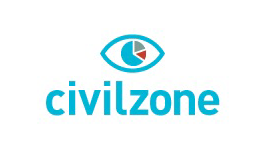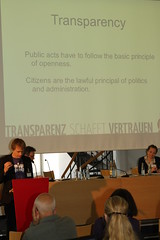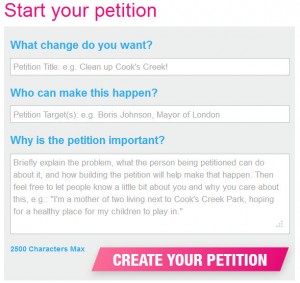 |
2. September 2012 – 12:34 by gabor
|
 A couple of weeks ago, Anthony Zacharzewski, social activist of The Democratic Society wrote a review on our association’s project that had the working title ‘webvotr’ and has since been named Civilzone.
A couple of weeks ago, Anthony Zacharzewski, social activist of The Democratic Society wrote a review on our association’s project that had the working title ‘webvotr’ and has since been named Civilzone.
We very much appreciate any feedback regarding the site and any comments would be greatly appreciated. Besides highlighting the elements of the initiative that he found most appealing and wishing us success, Anthony also raised a few interesting questions and pointed out some risky areas where we might not reach our original goals.
He suggested three possible problems.
Civilzone openly aims to mobilize society on international, national and at local government levels – Anthony thinks that in small local communities the so-called “Empty Restaurant Syndrome” might occur; due to the lack of users and interaction, the number of people joining smaller governmental units will not be enough to form a community able to make real changes and decisions. As an example, he quoted iCan, BBC’s similar project from ten years ago.
Although his worries are reasonable, I think this does not represent a real danger for us: there are two reasons why.
One of them is that while BBC forcefully tried to organise every single parish’s government from above, our scenario is completely different; we’ll try to begin organising the groups of administrators running the application on national level in as many countries as possible.

The administrators will post the parliamentary initiatives, then first the opponents are expected to demonstrate their dislike, and the ones in favour of the initiative will then show their support in reply to the negative arguments. Subsequently, there will hopefully be individual initiatives and perhaps success stories too, similarly to Hamburg’s Transparency Law.
Smaller communities will only be formed after this, as need for them emerges. As soon as we have at least one or two people willing to organise a community, they will be granted the opportunity from the administrators moderating the particular administrative area. By this time, results achieved on national and EU-levels will be the inspiration for many.
The other reason is that internet today is very different from what it used to be 10 years ago: not only regarding the number of users but also in terms of the transmission speed of information.
BBC’s iCan drew attention to the application but failed to generate activity. Even if a few individuals were determined to convince their friends and acquaintances of joining they could only attempt to do this through email and in person. Today the social network is a very active place where using the network of connections, clearly demonstrating the principle of 6-7 steps, the right information can spread on a global scale in seconds. Every comment left and every vote cast on civilzone will appear on the user’s Facebook wall, visible to all his friends, allowing societal participation to go viral.
I find the second query to be the most interesting: Anthony says that online experience so far has shown that only people from “the same side” can effectively cooperate on political matters. Besides many great examples, I can also point out current Hungarian ones: on Facebook, pages having around a hundred thousand likes, like One Million Strong for the Freedom of Press in Hungary or Viktor Orbán’s, it is clear that only people belonging to the same side can get along well. If every once in a while someone from “the other side” comes over, they either only want to disrupt the community, or if they’re actually trying to reason together or make a consensus, some keen users from the original community will make it clear with their atrocious comments that there’s no room for them here.
The difference for us lies in the fact that on civilzone we’ll have specific issues and initiatives that affect the lives of the people who live in the civil parishes rather than pages of organisations, parties and movements. So I hope that instead of supporting parties and taking sides, the discussion will focus on how much passing or rejecting a particular initiative can serve the interest of the community.
In order to promote this, we incorporated two features into the application: firstly, displaying the most popular pro and con arguments; secondly, the possibility of sending in articles or blog posts.
The third argument to be considered is the following: “How can it represent those offline, and how can it avoid just giving a stronger voice to those who (through education, wealth or position) already have a strong voice?”
Perhaps this is the area where we have the biggest cultural difference: in Hungary, besides online newspapers and weekly prints, there is only one radio station and one television channel that clearly voice the left wing’s standpoint – in opposition since 2010 – but even these are experiencing various difficulties. The internet on the other hand is widely known as a source of objective information and a means of taking a clear look at both sides of the coin. With regard to the above, the application would actually amplify the voice of those who are now in minority besides the crowds who voted the present government into constitutional supermajority.
Freedom of press is of course a separate issue; the parallelism here is not entirely correct.
I think that Anthony’s following query is the most relevant: it is true that those without internet access will not have a chance to effectively represent their interest through the application. Even though the growth is unstoppable and 92.9% of Sweden’s, 84.1% of the UK’s and 82.7% of Germany’s population are already able to access the World Wide Web, the figures quoted still do not make up 100%.
One possible solution is to use the application to demonstrate even more clearly that in an information society, internet access should be a universal human right – numerous countries (Estonia, Finland, France, Spain and Greece) have succeeded in implementing this. Civilzone could provide a way to start a petition in the European Union and it could be a useful, influential tool in shaping politics and the public opinion even for those wanting to help people living on the edge of the society.
In my personal opinion, the most challenging part of the project is building an international network. Even though I don’t have years of experience in this field I can see that in the case of e-participation or at least in organising activism through the internet, civilians – especially the younger members of the Y and the almost grown-up members of the Z-generation – are more successful than civil activists and also that thinking and keeping in touch on European or global level is quite rare.
It is very fortunate that organizations like PEP-NET and Participedia exist and improve the situation greatly, allowing us to write to you here, but I think more activity, discussions, statements, petitions and demonstrations, all in all, more participation is required to achieve our common goals.
Because of this, I’d like to ask everyone to write if they feel like they have something to comment about the present or the previous article; let’s ease the burden on John Heaven’s shoulders a little!
If you prefer paying attention from the background, I’d like to recommend Anthony’s organization and also our organization.
Let’s do some networking.
Posted in members, Projects | No Comments »
















